
Dirona is a genus of sea slugs, Pacific Ocean nudibranchs, marine, opisthobranch gastropod mollusks in the family Dironidae.
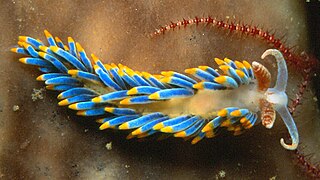
Nudibranchs are a group of soft-bodied marine gastropod molluscs that shed their shells after their larval stage. They are noted for their often extraordinary colours and striking forms, and they have been given colourful nicknames to match, such as "clown", "marigold", "splendid", "dancer", "dragon", and "sea rabbit". Currently, about 3,000 valid species of nudibranchs are known.

Sea slug is a common name for some marine invertebrates with varying levels of resemblance to terrestrial slugs. Most creatures known as sea slugs are gastropods, i.e. they are sea snails that over evolutionary time have either completely lost their shells, or have seemingly lost their shells due to having a greatly reduced or internal shell. The name "sea slug" is most often applied to nudibranchs, as well as to a paraphyletic set of other marine gastropods without obvious shells.

Metarminoidea is a provisional taxonomic superfamily of colourful sea slugs, aeolid nudibranchs, marine opisthobranch gastropod molluscs in the clade Nudibranchia.

Glaucus marginatus is a species of small, floating, blue sea slug; a pelagic (open-ocean) aeolid nudibranch; a marine opisthobranch gastropod mollusc in the family Glaucidae. This species is closely related to Glaucus atlanticus, and is part of a species complex along with Glaucus bennettae, Glaucus thompsoni, and Glaucus mcfarlanei. Like Glaucus atlanticus, it is commonly known as a blue dragon.
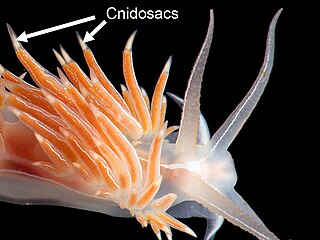
Cerata, singular ceras, are anatomical structures found externally in nudibranch sea slugs, especially in aeolid nudibranchs, marine opisthobranch gastropod mollusks in the clade Aeolidida. The word ceras comes from the Greek word "κέρας", meaning "horn", a reference to the shape of these structures.
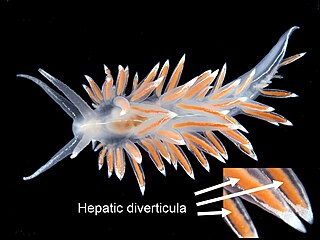
As applied to mollusks, the Neo-Latin term diverticulum is an anatomical feature. The term is most often encountered in the plural form as "diverticula", "hepatic diverticula", or "digestive diverticula", which are anatomical terms for organs which are visible from the outside of the body in a clade of sea slugs known as aeolid nudibranchs, marine opisthobranch gastropod molluscs.

Doto amyra, or the hammerhead doto, is a species of very small or minute sea slug, a nudibranch, a shell-less marine gastropod mollusk in the family Dotidae.

The alabaster nudibranch, white-lined Dirona, or frosted sea slug is an Eastern Pacific Ocean opisthobranch gastropod mollusk in the family Dironidae.

Pteraeolidia ianthina is a sea slug, an aeolid nudibranch in the family Facelinidae. It is known as a blue dragon, a name it shares with Glaucus atlanticus and Glaucus marginatus.
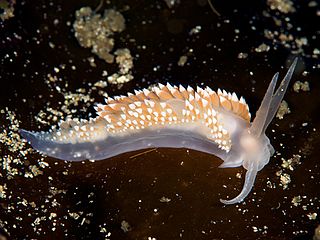
Coryphella verrucosa, is a species of sea slug, an aeolid nudibranch, a marine gastropod mollusc in the family Coryphellidae.

Carronella pellucida is a species of sea slug, an aeolid nudibranch, a marine heterobranch mollusc in the family Flabellinidae. It is occasionally referred to as the milky white sea slug, the pellucid aeolid, or the red-gilled nudibranch, though these names are not commonly accepted in formal settings.
Samla telja is a species of sea slug, an aeolid nudibranch, a marine heterobranch mollusc in the family Samlidae.
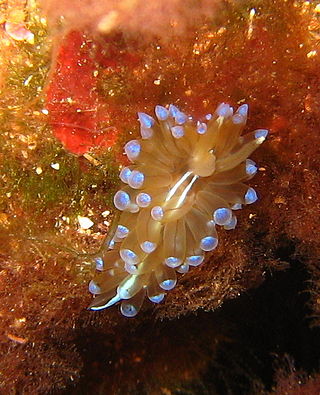
Antiopella cristata, sometimes known by the common name crested aeolis, is a species of nudibranch, a marine gastropod mollusc in the family Janolidae.

A cnidosac is an anatomical feature that is found in the group of sea slugs known as aeolid nudibranchs, a clade of marine opisthobranch gastropod molluscs. A cnidosac contains cnidocytes, stinging cells that are also known as cnidoblasts or nematocysts. These stinging cells are not made by the nudibranch, but by the species that it feeds upon. However, once the nudibranch is armed with these stinging cells, they are used in its own defense.

Tenellia phoenix is a species of sea slug, an aeolid nudibranch, a marine gastropod mollusc in the family Fionidae.
Cerberilla tanna is a species of sea slug, an aeolid nudibranch, a marine heterobranch mollusc in the family Aeolidiidae.
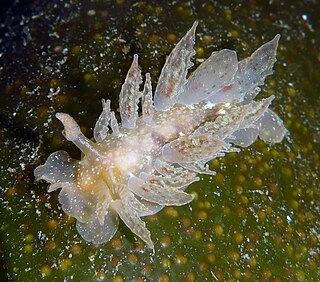
Dirona picta, common name colorful dirona, is a species of sea slug, an Eastern Pacific Ocean nudibranch, a marine, opisthobranch gastropod mollusk in the family Dironidae.

Godiva rachelae is a species of sea slug, a nudibranch, a shell-less marine gastropod mollusc in the family Facelinidae.

Melibe colemani, also known as the Coleman's melibe, ghost nudi, or ghost melibe, is a species of nudibranch in the family Tethydidae. Discovered by Neville Coleman in 2008 off the coast of the island of Mabul in Malaysia, it was formally described by Marta Pola and Terrence Gosliner in 2012 and named in honour of its discoverer. It is found throughout the Coral Triangle region of Malaysia, Indonesia, and the Philippines.

















